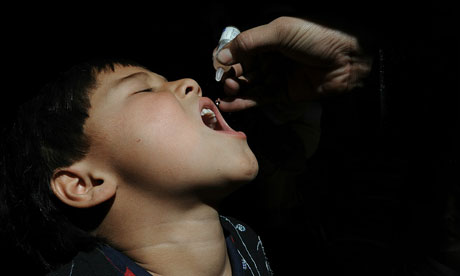- guardian.co.uk,
Tuesday 4 January 2011 14.58 GMT
- Article history

More than 22,000 community health volunteers in Afghanistan are vital to the country's health system but some are beginning to wonder if they might provide a more effective service if they were paid, and had formal work contracts.
From the implementation of immunisation campaigns to the delivery of basic healthcare services and dissemination of critical health messages, the health volunteers, also known as community health workers (CHWs), are "first line healthcare providers", officials say.
"If we are to see Afghanistan's public health system stand on its own two feet, we have to develop a system that can sustain the interest and commitment of CHWs who are, in fact, volunteers," said Suraya Dalil, the acting public health minister.
"If we don't remunerate their work or fail to provide facilities for them, I think we will risk losing a very precious health asset in this country," Sayed Habib Arwal, director of the community-based health care department in the health ministry, told IRIN. "CHWs are saving lives, reducing diseases and enhancing awareness about health issues. We would be unable to sustain the existing healthcare system without them."
Every community health volunteer/worker undergoes a six-month, free-of-charge, health ministry training course which equips them to provide basic and emergency health services and advice.
MDGs
The World Health Organisation (WHO) appears to back the above stance of health officials: "We really need to train more female CHWs and community health supervisors and bring them into the workforce if we are to achieve millennium development goals (MDGs) four and five targeting maternal and child health in Afghanistan," Peter Graaff, WHO representative in Afghanistan, was quoted as saying in a joint press statement on 5 December.
Despite reported progress in the health sector thanks to donor funding and NGO activities over the past eight years, Afghanistan still has some of the worst health indicators in the world: Every day almost 50 women die during pregnancy or childbirth; one in every five children dies before their fifth birthday. A lack of skilled health workers - only two doctors per 10,000 people, according to WHO - particularly in insecure and rural areas, is resulting in serious health problems.
Over the next five years, the Ministry of Health plans to reduce infant and maternal mortality by 50% and expand basic healthcare services to 95% of the country. Achieving these MDG objectives will require almost $1bn, thousands of additional health workers and volunteers, and increased collaboration with NGOs, officials and experts say.
The country spends about 5% of its gross domestic product ($11.6bn in 2007) on health, and relies extensively on donor funding for the health sector.

No comments:
Post a Comment